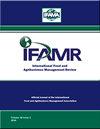Adopting modern agricultural technologies and impact on economic performance: evidence from cashew farmers in Kenya
IF 1.5
4区 经济学
Q3 AGRICULTURAL ECONOMICS & POLICY
International Food and Agribusiness Management Review
Pub Date : 2023-03-27
DOI:10.22434/ifamr2021.0100
引用次数: 0
Abstract
Despite the inherent potential of and merits in adopting modern agricultural technology, the present-day farmer in Sub-Saharan Africa is yet to catch up with the rest of the world in harnessing this potential. To extend the knowledge in the adoption of technology theory, this study examines factors, in particular farmers’ group participation and access to agricultural extension services on farmers’ adoption of modern agricultural technologies (specifically, the use of fertilizers, chemicals and appropriate plant density) and the consequent impact of adopting these agricultural technologies on farmers’ economic performance (income) in the coastal regions of Kenya. Logit regression and multiple linear regression models were used to analyse a sample of 372 smallholder cashew farmers in the Coastal Province of Kenya in 2018. The results show that access to extension services and group membership have statistically significant effects on adopting modern agricultural technologies, namely on fertilizer and pesticide usage and appropriate planting densities. However, fertilizer usage had a negative effect on economic performance while pesticide application showed no effect, and higher planting density had a positive effect. The study recommends that the policy should prioritize extension programs that leverage local platforms such as farmer groups to disseminate agricultural information and economically feasible technologies, such as appropriate cashew planting density – as this was shown to lead to more profitable agribusiness ventures.采用现代农业技术及其对经济绩效的影响:来自肯尼亚腰果农民的证据
尽管采用现代农业技术具有内在的潜力和优点,但撒哈拉以南非洲地区的农民在利用这一潜力方面仍未赶上世界其他地区。为了扩展采用技术理论方面的知识,本研究考察了肯尼亚沿海地区农民采用现代农业技术(具体而言,使用化肥、化学品和适当的植物密度)时,农民群体参与和获得农业推广服务的因素,以及采用这些农业技术对农民经济绩效(收入)的影响。使用Logit回归和多元线性回归模型分析了2018年肯尼亚沿海省372名腰果小农的样本。结果表明,获得推广服务和群体成员资格对采用现代农业技术,即化肥和农药的使用和适当的种植密度有统计学显著影响。施用化肥对经济效益有负面影响,施用农药对经济效益无影响,提高种植密度对经济效益有积极影响。该研究建议,该政策应优先考虑利用当地平台(如农民团体)传播农业信息和经济上可行的技术(如适当的腰果种植密度)的推广项目,因为事实证明,这可以带来更有利可图的农业综合企业。
本文章由计算机程序翻译,如有差异,请以英文原文为准。
求助全文
约1分钟内获得全文
求助全文
来源期刊

International Food and Agribusiness Management Review
AGRICULTURAL ECONOMICS & POLICY-
CiteScore
2.90
自引率
0.00%
发文量
0
审稿时长
>12 weeks
期刊介绍:
The IFAMR is an internationally recognized catalyst for discussion and inquiry on issues related to the global food and agribusiness system. The journal provides an intellectual meeting place for industry executives, managers, scholars and practitioners interested in the effective management of agribusiness firms and organizations.
IFAMR publishes high quality, peer reviewed, scholarly articles on topics related to the practice of management in the food and agribusiness industry. The Journal provides managers, researchers and teachers a forum where they can publish and acquire research results, new ideas, applications of new knowledge, and discussions of issues important to the worldwide food and agribusiness system. The Review is published electronically on this website.
The core values of the Review are as follows: excellent academic contributions; fast, thorough, and detailed peer reviews; building human capital through the development of good writing skills in scholars and students; broad international representation among authors, editors, and reviewers; a showcase for IFAMA’s unique industry-scholar relationship, and a facilitator of international debate, networking, and research in agribusiness.
The Review welcomes scholarly articles on business, public policy, law and education pertaining to the global food system. Articles may be applied or theoretical, but must relevant to managers or management scholars studies, industry interviews, and book reviews are also welcome.
 求助内容:
求助内容: 应助结果提醒方式:
应助结果提醒方式:


